七年级下册英语
七年级下册优秀英语范文(英语七年级下册作文十篇)
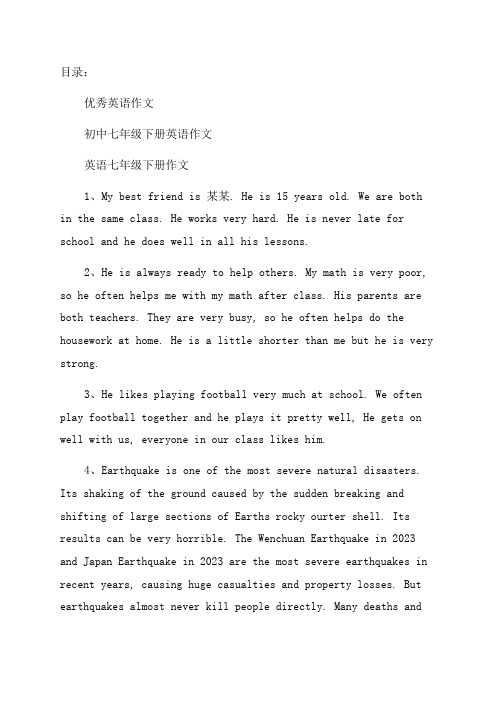
目录:优秀英语作文初中七年级下册英语作文英语七年级下册作文1、My best friend is 某某. He is 15 years old. We are both in the same class. He works very hard. He is never late for school and he does well in all his lessons.2、He is always ready to help others. My math is very poor, so he often helps me with my math after class. His parents are both teachers. They are very busy, so he often helps do the housework at home. He is a little shorter than me but he is very strong.3、He likes playing football very much at school. We often play football together and he plays it pretty well, He gets on well with us, everyone in our class likes him.4、Earthquake is one of the most severe natural disasters. Its shaking of the ground caused by the sudden breaking and shifting of large sections of Earths rocky ourter shell. Its results can be very horrible. The Wenchuan Earthquake in 2023 and Japan Earthquake in 2023 are the most severe earthquakes in recent years, causing huge casualties and property losses. But earthquakes almost never kill people directly. Many deaths andinjuries in earthquaking result from falling objects and the collapse of buildings.1、I can't eat in class; I must listen to the teacher carefully, because I will learn a lot from the teacher. I can't listen to music in class. I have to obey every rule.2、I must be quiet in class. In Chinese class, I can't drink water. In English class, I have to do some reading. Oh, I can't stand the rules, but nobody can break them.3、After class, I can't fight with my classmates or run in the corridor. I can't talk loudly in the cafeteria.4、it is very cold these days. it is winter and the weather always changing just like a baby's temper. we can't predict what it will be tomorrow precisely.优秀英语作文优秀英语作文1、Li Ming i our monitor. She i tall, healthy and lively. She doe well in all ubject. She i fond of port and i good at inging and dancing.3、Li Ming i modet and alway ready to help other. She i very trict with herelf in her work and daily life. She et u all afine e某ample.4、李明努力学习英语。
七年级英语下册(人教版)全册笔记超详细
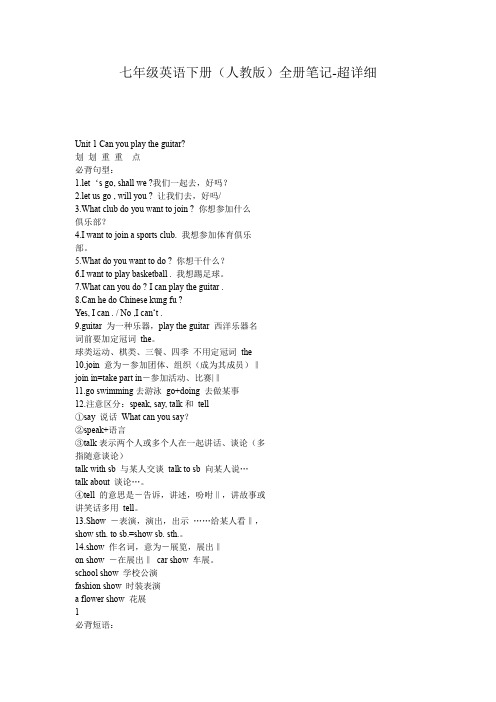
七年级英语下册(人教版)全册笔记-超详细Unit 1 Can you play the guitar?划划重重点必背句型:1.let‘s go, shall we ?我们一起去,好吗?2.let us go , will you ? 让我们去,好吗/3.What club do you want to join ? 你想参加什么俱乐部?4.I want to join a sports club. 我想参加体育俱乐部。
5.What do you want to do ? 你想干什么?6.I want to play basketball . 我想踢足球。
7.What can you do ? I can play the guitar .8.Can he do Chinese kung fu ?Yes, I can . / No ,I can‘t .9.guitar 为一种乐器,play the guitar 西洋乐器名词前要加定冠词the。
球类运动、棋类、三餐、四季不用定冠词the10.join 意为―参加团体、组织(成为其成员)‖join in=take part in―参加活动、比赛|‖11.go swimming去游泳go+doing 去做某事12.注意区分:speak, say, talk和tell①say 说话What can you say?②speak+语言③talk表示两个人或多个人在一起讲话、谈论(多指随意谈论)talk with sb 与某人交谈talk to sb 向某人说…talk about 谈论…。
④tell 的意思是―告诉,讲述,吩咐‖,讲故事或讲笑话多用tell。
13.Show ―表演,演出,出示……给某人看‖,show sth. to sb.=show sb. sth.。
14.show 作名词,意为―展览,展出‖on show ―在展出‖car show 车展。
人教版初中英语七年级下册全册英教案(全英文版)
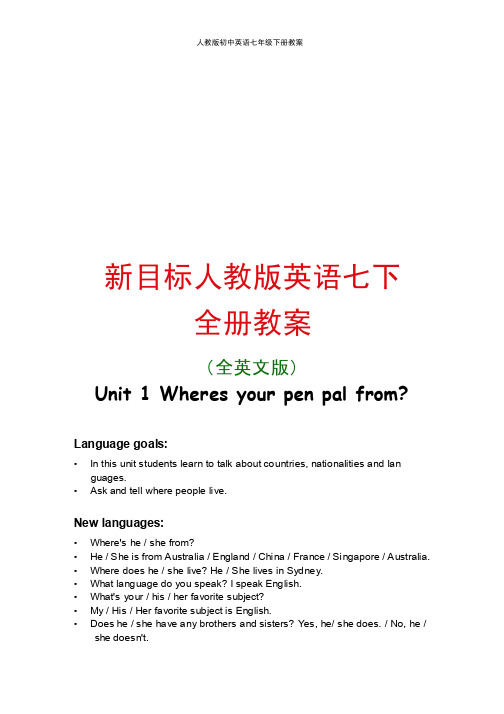
新目标人教版英语七下全册教案(全英文版)Unit 1 Wheres your pen pal from?Language goals:•In this unit students learn to talk about countries, nationalities and Ian guages.•Ask and tell where people live.New languages:•Where's he / she from?•He / She is from Australia / England / China / France / Singapore / Australia. •Where does he / she live? He / She lives in Sydney.•What language do you speak? I speak English.•What's your / his / her favorite subject?•My / His / Her favorite subject is English.•Does he / she have any brothers and sisters? Yes, he/ she does. / No, he / she doesn't.Difficult points:1. Liste ning for the in formation about cou ntries, natio nalities and Ian guages. Write an e-mail about on eself. Describe the new stude nts in class.2. Where questions with fromWhere questions with liveWhat questi onsTeaching aids:• A tape recorderTeaching periods:•Period 1:Section A 中1a, 1b, 1c•Period 2:Section A 中2a, 2b, 2c, 2d•Period 3:Section A 中3a, 3b, 4•Period 4:Section B 中1,2a, 2b, 2c•Period 5:Section B 中3a, 3b, 3c, 4•Period 6:Self CheckPeriod 1Teaching aims:1. Teach vocabulary words.2. Target Ianguages:Where's your pen pal from?He is from Australia.3. Enable the students to learn to talk about nationalities.4. Help the students learn how to talk about nationalities.Teaching procedures:Step 1. Free talk2 Say: Do you have any friends? Where is she from?Help the students make the same sentences and give them more chances to say.Step 2. Talking about the picture (1a)Hold up the picture on page 1 and point at the map. Ask students toread the picture.Ask some of you to read them aloud to the class. Make the studentstalk about where people are from.Say: Du Chuan, where is your pen pal from?Ask the students to read the conversations in the picture.Step 3. Listening (1b)Point to the numbered list of words and play the recording for a secondtime.Ask the students to listen to the recording and circle the countries in 1a.Ask students to listen to and repeat after the recording and then checkthe answers.Step 4. Pair work(1c)1. Now work in pairs and read the conversations in 1a with your partner.You can talk about your own pen pal.2. Ask the students to look at their own clothes and the things in theirbackpack. Ask and answer questions about where they are from.Homework1. Ask the students to practice talking about where people are from and make up real dialogues.2. Learn the words in this unit (on page 115) by heart.Period 2Teaching aims:1. Learn the vocabulary words and useful expressions.2. Target languages: Where does he live? He lives in Toronto.3. Let the students learn to talk about where people live.4. Help the students learn how to talk about where people live.Teaching procedures:Step I.StepI RevisionCheck the homework. And then ask several students to answer questi ons.Say: Where are you from? Do you have a pen pal? Where is your pen pal from?Step 2. Presentation (2a)Put a map of the world on the blackboard.Say: What's the meaning of capital? Can you guess? Help them to answer.Write Australia, the United States, Canada, France, and Japan on theleft of the blackboard. And write Sydney, New York, Paris, Toronto, andTokyo on the right of the blackboard. And the teacher reads them aloudand asks students to repeat.Then ask students to match the cities with the countries.Step 3. Talk about countries and citiesAsk the students to work in pairs, asking about the cities and the countries.Say: Now work in pairs and ask where the city is. For example, the firststudent asks "Where is Beijing?” the second student answers “It's inChina."Then tell the students to ask question about Chinese cities.Step 4. Listening (2b, 2c)Tell the students to read the list of countries and cities in 2a.Say: Now let's look at the list of countries and cities in Activity 2a. I will ask some students to read them aloud to the class.Call the students' attention to the chart in 2c.Tell the students to listen to the conversations in Step 4 again to complete the chart.Step 5. Pair work(2d)Ask the students to read the conversations in the bubble. Then askthem to talk about the in formation in the chart in 2c.Then ask the students to work in groups and make up new dialogueswith their own information.Step 6.GrammarfocusReview the grammar box.Say: You have to pay attention the word "from". It always follows verb be, while live comes out alone in where sentences. Now make more sentences with where, from and live.Write the following on the blackboard.Say, now work in pairs and make dialogues after the model above.Homework1. Ask the stude nts to learn the sentence patter ns in Grammar Focus by heart. Try to use them freely.2. Remember the words in this unit (on page 115).3. Make a similar dialogue according to the conversation in 2d.Period 3Teaching aims:1. Teach vocabulary words.2. Target Ianguages: What Ianguage does she speak? She speaks English.3. Enable the students to learn to talk about what Ianguage people speak.4. Help the students to learn how to talk about what language people speak.Step 1. Free talkSay, Morning, boys and girls. Nice to see you again. Do you remember we have learned about how to ask where people are from and how to ask where people live? Now I want some of you to answer my questi ons.(Turn to a student.)Where are you from?Give more students chances to speak in class.Step 2. Presentation (3a)Say: Do you know the meaning of "Ianguage"? Listen: Tim is from England and he speaks English. So English is his Ianguage. I'm fromChina, so Chinese is my language .Now look at activity 3a.on page 3.Read the instructions to the class. Ask students to work in pairs as theyanswer the questions.Show the flowing and ask the students to make conversations after themodel.Step 3. Pair work (3b)Ask the students to pay attention to the conversation in Activity 3b.Say, Read the dialogue by yourselves. Then I will ask some pairs to act out the dialogue in class.Show a map of the world. Ask students to work in pairs.Step 4. Quiz(4)Ask the students to look at activity 4 then work in pairs and do the quiz.HomeworkAsk the students to work with their friends and practice the dialogue in activity 3b.Period 4Teaching aims1. Teach vocabulary words.2. Target languages:Does she have any brothers and sisters?Is that your new pen pal?Yes, it is.3. Enable the students to learn to talk about their new pen pals.4. Help the students learn how to talk about their new pen pals.Step 1. RevisionAsk the students to make conversations talking about their new pen pal.Ask some pairs to the front to talk about their pen pals. Greet each otherand have a free talk with classmates.Talk about the persons they admire.Step 2.Match work (1)Ask the students to pay attention to the notebook page with the countries listed.Ask the students to write the letter of the correct country in the box next to the title of each Ianguage textbook on the desktop.Step 3. Listening (2a, 2b)First, read the instructions and tell the students to read the conv ersati on bubbles.Check the answers. Then ask the students to read the questions again.Ask the students to fill in the chart.Give students 1 minute to finish the task. Check the answers with the stude nts.Then play the recording again and ask the students to repeat.Step 4. Pair work (2c)Ask two students to work in pairs, practicing the questions in activity 2a.Then tell the students to practice dialogues similar to the dialogue inactivity 2a in pairs. They can use their own names.HomeworkAsk the students to make up similar dialogues using the following words: Sam, the Unites Sates, New York, a brother and a sister, English and French.Period 5Teaching aims1. Teach vocabulary words.2. Target languages:I think China is a very interesting country.I like going to the movies with my friends and playing sports.My favorite subject in school is P.E.It's fun. / It's too difficult.3. Enable the students to write a pen pal letter.4. Help the students learn how to write to a pen pal.Step 1 .Warming upSay, Do you have a pen pal? Whafs his name? Does he have any brothers and sisters? What Ianguage does he speak?Then ask the students to work in pairs to talk about their pen pal.Step 2. Reading (3a)Ask the students to read the letter on page 5.Point the four questions beneath the letter.When the students finish reading the letter, ask the four questions orally and ask them to answer orally.Ask the students to retell the letter, using their own words.Step 3. Reading and writing (3b)Ask the students to pay attention to the letter from Tom King.Point out the blanks in the letter and the information card on the right.Correct the an swers. Then draw the in formation card on the blackboard and then ask the students try to retell the letter.Step 4. WritingAsk the students make their own information card.After they are finished, ask several students to read their e-mails in class.HomeworkAsk the students to choose one of the following tasks as homework.1. Show a name card to the students and ask them to write something about it.2. The students change their information card with their partner and writesomething about their partner.Period 6Teaching aims:1. Teach vocabulary words.2. Enable the students to describe the new students in the class.3. Help the students learn to describe the new students in the class.Teaching procedures:Step 1. RevisionPractice talking about one of the students.Say, Take out your information cards. And change it with your partner.Read it carefully and make up an oral practice, talking about yourpartner.Step 2.Key word checkAsk the students to read all the words in this part.Say: In learning to talk about where people are from, you learned many words on the topic. Now read and check the words you know in 1 on page6. Then say a sentence with each of them.Step 3.Vocab-BuildersAsk students to write five new words in their Vocabulary-Builder on page 112. After they are finished, ask two students to write their words down on the blackboard. And ask them to read the words and the whole class repeat. And tell the whole class to remember them after class.Step 4.WritingLet the students pay attention to the pictures.Say, Look at the picture of Sally. How old do you think she is? Where do you think she is from? What language do you think she speaks? What do you think she likes? What do you think she dislikes?The same step goes with Jim and Julie.After a few minutes, ask some students to read their descriptions to the class.Step 5.SpeakingAsk the students to do an oral practice about the new classmates.Say, There are several new students in our class this term. Who do youlike best? Why do you like him or her? Please tell us. First you can tellyour partner.Ask some students to present their work to the class.Step 6. Just for Fun!Ask all students to read the conversation.Let the students practice in pairs.HomeworkAsk the students to summarize what they have learned in this unit and prepare for the next unit.Unit 2 Where is the post office?Language goals:•In this unit students learn to talk about asking for and give directions on the street.New languages:•Excuse me, is there a bank near here?•Yes, there is. It's on Center Street.•Where is the pay phone?•lt*s across from / next to / in front of / behind the library.•lt*s between the post office and the library.•Just go straight and tum left.•Turn left on First Avenue.•Take a walk through the park on Center Avenue.•There is a clean / dirty park near my house.Difficult points:1. Listening for the information of the names of the neighborhoodRead the tour guide and an e-mail from a friend you're going to visitWrite the dialogues about asking the way and giving directions.2. Where questions.Affirmative statementsPrepositions of placeTeaching aids:• A tape recorder•Some picturesTeaching periods:Period 1: Section A1a, 1b, 1cPeriod 2: Section A2a, 2b, 2cPeriod 3: Section A3a, 3b, 4Period 4: Section B 1a, 1b, 1c, 2a, 2b, 2cPeriod 5: Section B 3a, 3b, 3c, 4Period 6: Self CheckPeriod 1Teaching aims:1. Teach vocabulary words.2. Target Ianguages: Is there a bank near here? Yes, there is. It's on CenterStreet.3. En able the stude nts to ask for and give di recti ons on the street.4. Help the students to ask for and give directions on the street.Teaching procedures:Step 1. Warming upShow three pictures prepared before class to the students. There is acat in a box in picture 1. There is a cat on a box in picture 2. There is acat under the box in picture 3.Then ask some students to ask and answer these questions.Step 2.Match work (2a)Ask the students to read the picture and the words in the numbered list.Ask the students to match each word or phrase on the list with one of the pictures.Then check the answers.Present the new sentence patterns.Then ask the students to read the dialogue in the picture.Step 3. Listening (1b)Ask the students to listen to the conversations and circle the places in 1a.Change the roles and do the same again.Then students ask and answer without the help of the recording.Step 4. PracticePoint to the different locations shown in the picture. Ask different students to name each one.Then point to more locations and let the students to practice more.Homework1. Practice the conversation in the picture on page 7.2. Learn the new words and phrases in this period by heart.Period 2Teaching aims:1. Learn the vocabulary words and useful expressions.2. Target languages:The pay phone is across from the library.The pay phone is next to the library.The pay phone is between the post office and the library.The pay phone is on Greet Street.The pay phone is in front of the library.The pay phone is behind the library.3. Enable the students to talk about the position of a place.4. Help the students to talk about the position of a place.Teaching procedures:Step 1. Revision and warming upCheck the homework by talking about the pictures on page 7 with thestudents or prepare some other pictures with different buildings in itand let the students practice asking and answering questions about theplaces.Ask the students to practice more.Step 2. Presentation (2a)Introduce the items across from, next to, between, in front of, behind and on.Draw the following picture on the blackboard.Park 3 Centre StreetEncourage or help the students to answer: It's across from the library.The same way goes with next to, on and in front of.Ask the students to match each sentence with one of the pictures.Then ask the students to read the six sentences and match thesentences the pictures.Check the answers.Step 3. Listening(2b)Review the buildings and street names in Activity 1a and the six sentences in 2a.The read the six sentences in 2b to the class.Ask the students to listen to the recording and fill in the blanks.Play the tape. Check the answers.Step 4. Practice (2c)Ask the students to repeat the conversations after the recording.Ask the students to do the Pair work asking and answering questions about the places in 1a.Step 5.Grammar FocusAsk the students to read the sentences in the grammar box aloud. The ask them to answer the following questions. Explain some Ianguage points if the students can't understand.Homework• Ask the students to practice talking about their neighborhood in pairs.Period 3Teaching aims:1. Teach vocabulary words.2. Target Ianguages:Just go straight and turn left.It*s down Bridge Street on the right.Ifs next to a supermarket.3. Enable the students to talk about the neighborhood.4. Help the students to talk about the neighborhood.Teaching procedures:Step 1. RevisionLet the students look at the picture in activity 1a. And ask some studentsto answer some questions in order to check the homework.Say, Is there a library near here? Where is it? Is there a bank near here?Where is it?Put up the picture of activity 2a on the blackboard and ask them to makeconversations.Step 2. Presentation (3a)Guide the students to guess the meanings of the three traffic signs. Show the pictures and ask some questions about the pictures.Then ask the students to hold up their left hands and then their right hands to practice “left” and "right".Point to the picture and let the students read the conversation.Ask the students to read the conversations. Then ask them to find Paul and Nancy in the picture.Ask the students to role play the conversation then point out the place that Paul wants to get to.Step 3. Complete the conversations (3b)Ask the students to make conversations and answer the questionsbelow each picture.The students point out the place in the picture. And write down theanswers on the line in the pictures. Or ask a pair of students to say theconversation, the others point to the speakers' place.Step 4. GameAsk the students to look at the picture in Activity 1a and name all thebuildi ngs.Ask some students to read the conversation in the picture in Activity 4.And then explain the instruction to the student.Then ask some groups to present their work.Homework• Ask the students to make a similar conversation to that in Activity 3a.Period 4Teaching aims:1. Teach vocabulary words.2. Target languages:Is there a big supermarket near your house?Yes, there is.There is a big supermarket.No! There is a small supermarket.3. Enable the students to describe the neighborhood.4. Help the students to describe the neighborhood.Teaching procedures:Step 1. RevisionCheck the homework by asking the following questions.Say, Look at the picture in activity 3a. Suppose you are standing nearthe building on the side of New Street. Please answer my questions.Excuse me. Is there a pay phone in the neighborhood?Ask another student to answer questions.Give more students chances to practice this dialogue.Step 2.Match work (1a)Bring in some objects or pictures to the students. (Two rulers, one is old, the other is new. Two boxes, one is big and the other is small. Two bottles, one is clean and the other is dirty. Two pictures of a street, one is busy and the other is quiet.)Say, Look at the rulers, please. Can you find the differenee between them?Yes. This one is old. (Show the old ruler.) And this one is new. (Show the new ruler.) Do you understand old and new?Ask the students to talk about the picture.Point to each half of each picture and ask about the differenee between the halves.Go on with the other pictures to teach the language items. Ask thestudents to match the words with the pictures.Step 3. Pair workCall attention to the conversation in the picture.Then ask the students to work in pairs and take turns asking each other questions about the things on the list of phrases in activity 1a on page 7.Step 4. Listening (2a, 2b)Ask the students to listen to the tape and circle the places in 1a.Say: Now please listen to the tape again. Listen to it and draw the places in Michael's neighborhood on the street map. Just listen.Play the recording.Play the recording again.Then have some students show their completed drawing to the class. Step 5. Pair workAsk the students to work in pairs talking about drawings to the class. Then ask some pairs to present their dialogues to the class.Ask the students to work in pairs, draw a map of their own neighborhood and practice asking and answering questions about the places they live in.Homework• Ask the students to make similar conversations to that in Activity 1 b.Period 5Teaching aims:1. Teach vocabulary words.2. Target languages:Turn left on First Avenue and enjoy the city's quiet streets and small parks.Take a walk through the park on Center Avenue.This is the beginning of the garden tour.Bridge is a good place to have fun.3. Enable the students to write a tour guide and draw the rout to somewhere.4. How to write a tour guide and draw the rout to somewhere.Teaching procedures:Step 1. RevisionCheck the homework by asking about the students neighborhood.Ask the students to work in pairs.Ask the students to work in pairs.Then ask some pairs to present their conversations to the whole class. Step 2. Reading (3a, 3b)Ask the students to read the tour guide.Divide the whole class into four groups to have a quiz.Tell the students to keep these words down and make at least twosentences with each word after class.After that ask the students to look at the pictures and fill in the blanks for this tour guide.Step 3.WritingAsk the students to write a tour guide with the students.Names of buildings and locations.Description wordsWords that talk about positions.Words that talk about di recti ons.Step 4. Pair work (4b)Learn to draw a picture of neighborhood. First ask the students toanswer the questions according to the pictures.Then ask the students to draw a picture according to the following conversati on.Then ask students to present their drawings to the whole class.Homework1. Ask the students to talk about the street and buildings in their own neighborhood.2. Ask the students to make sentences with the description words they keptdown in the class.Period 6Teaching aims1. Teach vocabulary words.2. Target Ianguages:I know you are arrivi ng n ext Sun day.Let me tell you the way to my house.I hope you have a good trip.3. Enable the students to write about the neighborhood.4. Help the students to learn how to write about the neighborhood.Teaching procedures:Step 1. RevisionCheck the homework by asking and answering some questions.Give more students chances to practice.Step 2.Key word check(1)Ask the students to check the words they know.Then ask the students to do the some exercises.Step 3.Vocab-Builders (2)Expand the students' vocabulary.After that ask the students to share their list with other students.Step 4. ReadingAsk the students to read the letter and draw the rout on the map.Ask the students to change the letter into a telephone conversation.Let the students pay attention to the pictures.Say, Look at the picture of Sally. How old do you think she is? Where do you think she is from? What language do you think she speaks? What do you think she likes?What do you think she dislikes?The same step goes with Jim and Julie.After a few minutes, ask some students to read their descriptions to the class.Step 5. Just for Fun!Call attention to the conversation in the cartoons.Ask the students to read the conversation and then answer the questi ons.Homework• Ask the students to do the following:1. Suppose your frie nd is going to visit you. He does n't know the way toyour house. Write a letter to him to tell him the route from the bus stop to your house.2. Review the next unit.Unit 3 Why do you like koalas?Language goals:•In this unit students learn to describe animals and express preferences.New languages:•Let's see the pandas first.•Why do you like want to see the pan das?•Because they are very cute.•Because they*re kind of shy.•Because they're kind of interesting.•Because they are fun.•Because they are smart.•Do you like giraffes?•Where are lions from?•They are from South Africa.•The animal is ugly / beautiful / friendly / small / shy / clever / cute / scary. •She likes to play with her friends and eat grass.•She's very beautiful, but she's very shy, so please be quiet•He sleeps during the day, but at night he gets up and eats leaves.Difficult points:1. Listening for the names of animals. Listen for the description words about animals.2. Read the description words about animals. Write about the animal you know.3. why, what, where questions, because, adjectives of qualityTeaching aids:• A tape recorder•Some picturesTeaching periods:•Period 1: Section A1a, 1b, 1c•Period 2: Section A2a, 2b, 2c•Period 3: Section A3a, 3b, 4•Period 4: Section B 1a, 1b, 1c, 2a, 2b, 2c•Period 5: Section B 3a, 3b, 3c, 4• Period 6: Self CheckPeriod 1Teaching aims:1. Teach vocabulary words.2. Target languages:Let's see the pan das.Why do you want to see the lions?Because they*re cute.3. Enable the students to talk about animals.4. Help the students learn how to listen to and talk about animals.Teaching procedures:Step 1. Warming upTalk about animals using pictures.Teach new words about animals by the pictures.Step 2.Match work (1a)Ask the students to read the words and the picture, and then match thenames with the pictures a-h.Encourage or help the students to say something about the picture anddo the match work.Step 3. Listening (1b)Point to the numbered list of words in activity 1a and play the recording.Ask the students to listen to the recording and circle the countries in 1a.Play the tape and then check the answers.Ask the students to listen to and repeat after the recording and thencheck the answers.Further activity: Ask the students to do some pair work in the followingway if they can understand the listening material well.Step 4. Pair work (1c)Ask the students to make conversations in pairs.Show the following.—Let's see the pan das / giraffes / lions / penguins / dolphi ns / koalas / elepha nts / tigers?—Why?——Because they're cute / interesting / fun / interesting / smart.Say: Now please make conversations in pairs, using the animals in activity 1a and the description words in activity 1c.Homework1. Ask the students to remember the new words in this period (on page 116) by heart.2. Ask the students to practice the conversation in activity 1 c.Period 2Teaching aims:1. Learn the vocabulary words and useful expressions.2. Target languages:I like dolphins.Why do you like dolphins?Because they are kind of interesting.3. Enable the students to talk about animals and tell why they like them.4. Help the students learn to talk about animals and tell why they like them. Teachi ng procedures:Step 1. Free talk and lead-inRevise the names of the animals.Say: In last period we learnt the names of some animals. Now let's do some revision. Please look at the pictures one by one and you have to tell me the name of the animal in the picture. OK?Show the students the animal pictures one by one.Revise the conversation learnt in the last period.Give more chances to more students to practice talking about the animals and expressing why they like the animals.Step 2. Listening (2a, 2b)First ask the students to listen and fill in the chart in activity 2a.Play the recording for the first time. Ask the students to listen carefully and write down the animals.Play the tape the second time.Ask the students to pay attention to the words in the box in Activity 2b.Ask the students to pay attention to the conversation in activity 2b. After that, check the answers.Then ask the students to listen to and repeat the dialogue after therecording.After this, ask the students to practice the conversation without the help of the recording.Step 3. Pair work (2c)Ask the students to work in pairs, ask and answer about animals they know.Ask the students to practice: Why? Because they are...Step 4.GrammarfocusAsk the students to read the sentences in the grammar box and sum up the sentence structure.Practice suggest!on: Ask the students to work in groups and write down。
七年级英语下册单词汇总
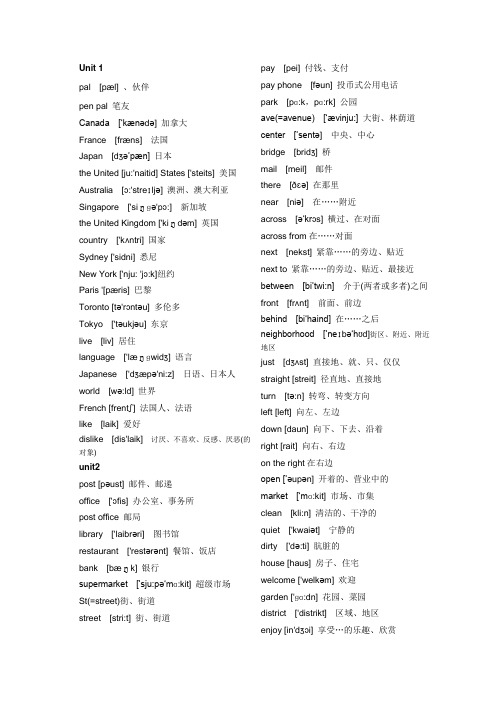
Unit 1pal [pæl] 、伙伴pen pal 笔友Canada [‘kænədə] 加拿大France [fræns] 法国Japan [dʒə’pæn] 日本the United [ju:'naitid] States ['steits] 美国Australia [ɔ:'streɪljə] 澳洲、澳大利亚Singapore ['siŋɡə'pɔ:] 新加坡the United Kingdom ['kiŋdəm] 英国country ['kʌntri] 国家Sydney ['sidni] 悉尼New York ['nju: 'jɔ:k]纽约Paris '[pæris] 巴黎Toronto [tə'rɔntəu] 多伦多Tokyo ['təukjəu] 东京live [liv] 居住language ['læŋɡwidʒ] 语言Japanese ['dʒæpə'ni:z] 日语、日本人world [wə:ld] 世界French [frentʃ] 法国人、法语like [laik] 爱好dislike [dis'laik] 讨厌、不喜欢、反感、厌恶(的对象)unit2post [pəust] 邮件、邮递office ['ɔfis] 办公室、事务所post office 邮局library ['laibrəri] 图书馆restaurant ['restərənt] 餐馆、饭店bank [bæŋk] 银行supermarket [’sju:pə‘mɑ:kit] 超级市场St(=street)街、街道street [stri:t] 街、街道pay [pei] 付钱、支付pay phone [fəun] 投币式公用电话park [pɑ:k,pɑ:rk] 公园ave(=avenue) [‘ævinju:] 大街、林荫道center [’sentə] 中央、中心bridge [bridʒ] 桥mail [meil] 邮件there [ðɛə] 在那里near [niə] 在……附近across [ə‘krɔs] 横过、在对面across from在……对面next [nekst] 紧靠……的旁边、贴近next to 紧靠……的旁边、贴近、最接近between [bi’twi:n] 介于(两者或多者)之间front [frʌnt] 前面、前边behind [bi‘haind] 在……之后neighborhood [’neɪbə‘hʊd]街区、附近、附近地区just [dʒʌst] 直接地、就、只、仅仅straight [streit] 径直地、直接地turn [tə:n] 转弯、转变方向left [left] 向左、左边down [daun] 向下、下去、沿着right [rait] 向右、右边on the right在右边open [’əupən] 开着的、营业中的market [‘mɑ:kit] 市场、市集clean [kli:n] 清洁的、干净的quiet ['kwaiət] 宁静的dirty ['də:ti] 肮脏的house [haus] 房子、住宅welcome ['welkəm] 欢迎garden ['ɡɑ:dn] 花园、菜园district ['distrikt] 区域、地区enjoy [in'dʒɔi] 享受…的乐趣、欣赏walk [wɔ:k] 散步、步行take a walk 散步through [θru:] 穿过、通过beginning [bi'ɡiniŋ] 开始tour [tʊr,tur] 旅行、游历visit ['vɪzɪt] 参观、浏览place [pleis] 地方、地点fun [fʌn] 愉快、开心have fun 玩得开心if [if] (表条件)如果hungry ['hʌŋɡri] 饥饿的arrive [ə'raiv] 到达、抵达way [wei] 路、路线、路途take [teik] 乘、坐、搭(车、船)taxi ['tæksi] 出租车、的士、计程车airport ['eəpɔ:t] 飞机场pass [pɑ:s] 通过hope [həup] 希望、盼望、期待yours [jɔ:z] 您的、你的(用在信末署名前,做客套语)unit 3koala [kəʊ'ɑ:lə] (澳洲)树袋熊、考拉tiger ['taiɡə] 老虎、虎elephant ['elifənt] 大象dolphin ['dɔlfin] 海豚panda [‘pændə] 熊猫lion [’laiən] 狮子penguin [‘peŋɡwin] 企鹅giraffe [dʒi’ræf,dʒi'rɑ:f] 长颈鹿zoo [zu:] 动物园cute [kju:t] 可爱的、聪明的map [mæp] 地图、图smart [smɑ:t] 聪明的漂亮的animal ['æniməl] 动物box [bɔks] 方框、盒、箱kind [kaind] of 有几分south [sauθ] 南、南方、在南方的、南部的、向南的Africa ['æfrikə] 非洲bingo ['biŋɡəu] 宾戈(一种游戏)ugly ['ʌɡli] 丑陋的、难看的clever ['klevə] 聪明的、机灵的friendly ['frendli] 友好的beautiful ['bju:təful] 美丽的、美好的shy [ʃai] 害羞的、羞怯的other ['ʌðə] 其他的、另外的grass [ɡrɑ:s] 草sleep [sli:p] 睡、睡觉during ['djuəriŋ] 在…期间at night在晚上、在夜里leaf [li:f] 叶子、树叶lazy ['leizi] 懒惰的、懒散的meat [mi:t] (食用)肉、肉类relax [ri'læks] 放松、休息unit 4shop [ʃɔp] 商店、店铺assistant [ə‘sistənt] 助手、助理shop assistant店员doctor ’ [‘dɔktə] dɔktə] 医生reporter [ri’pɔ:tə] 记者、通讯员policeman [pə‘li:smən] 男警察waiter [’weitə] 侍者、服务员bank clerk [bæŋk klɑ:k] 银行职员hospital [‘hɔspitəl] 医院now [nau] 现在、此时star [stɑ:] 担任主角、主演policewoman [pə’li:s‘wʊmən] 女警察nurse [nə:s] 护士money [’mʌni] 钱、金钱、货币give [ɡiv] 给、授予get [ɡet] 获得、得到、购买、拿来wear [wɛə] 穿、戴uniform [‘ju:nifɔ:m] 制服sometimes [’sʌmtaimz] 不时、有时in 在…期间、在…之内dangerous [‘deindʒərəs] 危险的thief [θi:f] 小偷、贼late [leit] 晚、晚于通常时间out [aut] 在外、向外talk [tɔ:k] 谈话、谈论station [’steiʃən] 车站、局、台TV station 电视台police [pə‘li:s] 警方、警察police station 警察局newspaper [‘nju:s’peipə] 报纸hard [hɑ:d] 辛苦地、努力地as [æz, əz] 作为at [æt, ət] 按照、根据summer [‘sʌmə] 夏季、夏天story [’stɔ:ri] 故事、事迹、小说magazine [‘mæɡə’zi:n] 杂志、期刊young [jʌŋ] 年轻的、年纪小的play [plei] 戏剧、剧本news [nju:z] 新闻、消息children [‘tʃɪldrən] (child的复数)孩子们international [‘ɪntə’næʃənəl] 国际的teach [ti:tʃ] 教、讲授skill [skil] 技能、技巧sir [sə:] 先生、阁下madam [‘mædəm] 女士、夫人Unit 5clean [kli:n] 打扫、清除read [ri:d] 读、阅读on [ɑn, ɔn] 通过、以…的方式apartment [ə’pɑ:tmənt] 公寓、住宅TV show [ʃəu] 电视节目sure [ʃuə] 当然、的确wait [weit] 等待、等候wait for等候、等待toy [tɔi] 玩具west [west] 西、西文、西文的、在西文的、向西文的act ivity [æk‘tiviti] 活动shop [ʃɔp] 买东西、购物mall [mɔ:l] 购物商场、商业街pool] [pu:l] 水池、水塘camera [’kæmərə] 照相机bird [bə:d,bɜːd] 鸟unit 6rain [rein] 下雨windy [‘wɪndi:] 有风的、多风的cloudy [’klaudi] 多云的、阴天的sunny [‘sʌni] 晴朗的snow [snəu] 下雪weather [’weðə] 天气、气候Moscow ['mɔskəu] 莫斯科Boston ['bɔstən] 波士顿cook [kuk] 烹调、煮study ['stʌdi] 学习how's=how isbad [bæd] 坏的、劣质的terrible ['terəbl] 很糟的、极坏的、可怕的pretty ['priti] 相当、很、颇hot [hɔt] 炎热的、热的cold [kəuld] 寒冷的、冷的cool [ku:l] 凉爽的warm [wɔ:m] 温暖的、暖和的humid ['hju:mɪd] 潮湿的、湿润的vacation [və'keiʃən] 假期、休假on vacation在度假、在假期中take a photo 拍照lie [lai] (现在分词lying)平卧、躺beach [bi:tʃ] 海滩look at 看、朝…看group [ɡru:p] 团体、组cool 令人满意的、绝妙的surprised [sə‘praɪzd] 感到惊讶的heat [hi:t] 热、热度relaxed [rɪ’lækst] 放松的、得到休息的winter [‘wintə] 冬季scarf [skɑ:f] (pl.scarfs或scarves)围巾everyone [‘evriwʌn] 每个人have a good time 玩得高兴、过得快乐man [mæn] 男人、人、人类Review of units 1-6describe [dis’kraib] 描述、形容look for寻找、寻求talk about谈论、讨论、议论direction [di‘rekʃən] 方向unit [’ju:nit] 单元most [məust] (mamy和much的最高级) 最following [‘fɔləuiŋ] 下列的、下述的in order to 为了improve [im’pru:v] 改进、改善Unit 7hair [hɛə,heə(r)] 头发、毛发curly [‘kɜ:li] 卷曲的、卷毛的straight [streit] 直的、笔直的tall [tɔ:l] 高的medium [’mi:djəm] 中等的height [hait] 高度thin [θin] 瘦的heavy [‘hevi] 重的build [bild] 体格、体形like像、如同always ['ɔ:lweiz] 总是、始终captain ['kæptin] 队长、首领team [ti:m] 队、组popular ['pɔpjulə] 受欢迎的、通俗的、流行的blonde [blɔnd] 金黄色的good-looking漂亮的bit [bit] 一点儿、少许a littleb it 一点儿、少许joke [dʒəuk] 笑话、玩笑never ['nevə] 决不、从不stop [stɔp] 停止、终止brown [braun] 棕色的、褐色的person ['pə:sən] 人、人物beard [biəd] 胡须glasses['glɑ:sɪz] 眼镜look外表、外貌remember [ri'membə] 牢记、记住pop [pɔp] 流行音乐(或歌曲)singer ['sɪŋə] 歌唱家、歌手not…any more 不再……say [sei] 说、讲nobody ['nəubədi] 没有人、没人Teeny ['ti:ni] 小矮人(teeny,极小的) Hugeman ['hju:dʒmæn] 巨人(huge,巨大的、庞大的)Dreamer ['dri:mə]梦想家(dreamer,空想家、梦想家) Wiseman ['waizmæn]智者(wise,有智慧的、聪明的)Unit 8would [wud, wəd] 表示意愿I'd=I wouldnoodle ['nu:dl] 面条、(常用复数)beef [bi:f] 牛肉mutton ['mʌtn] 羊肉cabbage ['kæbidʒ] 洋白菜、卷心菜potato [pə'teitəu] 土豆、马铃薯special ['speʃəl] 特色菜drink [driŋk] 饮料large [lɑ:dʒ] 大的、宽广的size [saiz] 大小、尺寸bowl [bəul] 碗、一碗的容量he'd=he wouldjuice [dʒu:s] 果汁、果汁饮料dumpling ['dʌmplɪŋ] 饺子porridge ['pɔ:rɪdʒ] 粥、糊tea [ti:] 茶、茶叶green [ɡri:n] 绿茶rice [rais] 米、稻、米饭soup [su:p] 汤、羹onion ['ʌnjən] 洋葱fish [fiʃ] 鱼、鱼肉Tel (=Telephone) 电话RMB 人民币Mon ( =Monday) 星期一Tues (=Tuesday) 星期二Wed (=Wednesday) 星期三Thurs (=Thursday) 星期四Fri (=Friday) 星期五reason ['ri:zən] 原因、理由menu ['menju:] 菜单Unit 9was [wʌz, wɔz,wəz] is的过去式did [did] do的过去式went [went] go的过去式visit ['vizit] 拜访、访问test [test] 考试、测验What about…?……怎么样stay [stei] 停留、留下at home在家have[hæv] 做、进行、从事do some reading ['ri:diŋ] 阅读practice ['præktis] 练习、实践regular ['reɡjulə] 正常的、规则的、有规律的verb [və:b] 动词irregular ] [ɪ'regjələ] 不规则的、无规律的present ['prezənt] 现在时态的、现在的、目前的past [pɑ:st] 过去时态的、以前的、过去的mountain ['mauntin] 山、山脉geography [dʒi'ɔɡrəfi] 地理学spend [spend] 度过、花费yesterday ['jestədi] 昨天No.(=number) 编号、号middle ['midl] 中间的、中等的middle school中学most [məust] 大多数的、大部分的、几乎全部的go shopping ['ʃɔpɪŋ] 购物had [hæd] have的过去式saw [sɔ:] see的过去式talk [tɔ:k] 访谈节目、谈话、交谈、演讲talk show [ʃəu] 访谈节目wrote [rəʊt] writer 的过去式song [sɔŋ] 歌、歌曲go for a walk云散步sit [sit] 坐、使坐下sat [sæt] sit的过去式down向下、在下面、下去、降低cat [kæt] 猫It is time to…该是……的时候了。
人教版七年级英语下册unit5(详细内容)
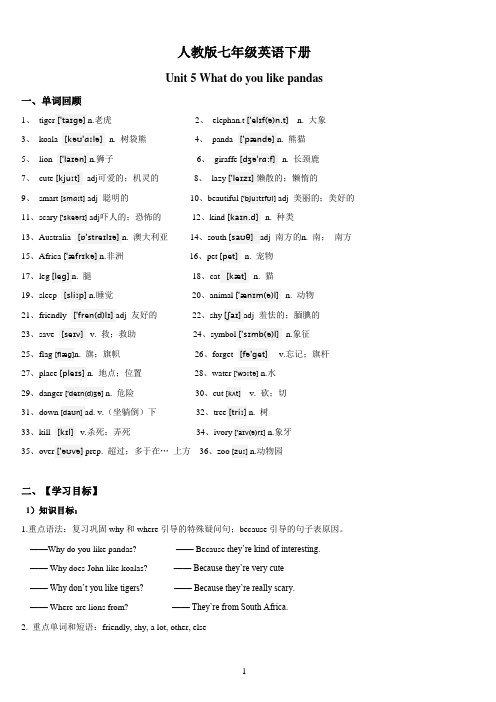
人教版七年级英语下册Unit 5 What do you like pandas一、单词回顾1、tiger['taɪgə] n.老虎2、elephan.t['elɪf(ə)n.t]n. 大象3、koala [kəʊ'ɑːlə]n. 树袋熊4、panda ['pændə] n. 熊猫5、lion ['laɪən] n.狮子6、giraffe [dʒə'rɑ:f]n. 长颈鹿7、cute [kjuːt]adj可爱的;机灵的8、lazy ['leɪzɪ]懒散的;懒惰的9、smart [smɑːt] adj 聪明的10、beautiful ['bjuːtɪfʊl] adj 美丽的;美好的11、scary ['skeərɪ] adj吓人的;恐怖的12、kind [kaɪn.d]n. 种类13、Australia [ɒ'streɪlɪə] n. 澳大利亚14、south [saʊθ]adj 南方的n. 南;南方15、Africa ['æfrɪkə]n.非洲16、pet [pet]n. 宠物17、leg [leg]n. 腿18、cat[kæt]n. 猫19、sleep [sliːp]n.睡觉20、animal ['ænɪm(ə)l]n. 动物21、friendly ['fren(d)lɪ]adj 友好的22、shy [ʃaɪ]adj 羞怯的;腼腆的23、save [seɪv]v. 救;救助24、symbol['sɪmb(ə)l]n.象征25、flag [flæg]n. 旗;旗帜26、forget [fə'get]v.忘记;旗杆27、place [pleɪs]n. 地点;位置28、water ['wɔːtə] n.水29、danger ['deɪn(d)ʒə] n. 危险30、cut [kʌt]v. 砍;切31、down [daʊn] ad. v.(坐躺倒)下32、tree[triː] n. 树33、kill [kɪl]v.杀死;弄死34、ivory ['aɪv(ə)rɪ] n.象牙35、over['əʊvə] prep. 超过;多于在…上方36、zoo [zuː] n.动物园二、【学习目标】1)知识目标:1.重点语法:复习巩固why和where引导的特殊疑问句;because引导的句子表原因。
七年级英语下册教案

七年级英语下册教案篇一:2022人教版七年级下册全册英语教案英语七年级(下)教案一、【教学目标】(一)语言知识1.词汇掌握wake,early, first,day, term,must,still,by,onfoot,the same to,usually,always,Ms.,boat,ship,sea,train,by plane/air/airplane, etc.2.理解Subway Worm reporter,Net Bar,roller skating Measuredining hall,dormitory bookstore,etc. (二)语法1.一般现在时(Simple present)2.频度副词(Adverbs of frequency)never, seldom, sometimes,often, usually, always, once, twice3.现在进行时(Present continuous) a. I’m looking for a book.b. Are you doing your homework? Yes, I am./No, I’m not.c. Is he/she...?Yes, he/she is. /No, he/she isn’t.d. What are you doing now? I’m playing computer games.e. What is he/she doing? He/She is...4.谈论交通方式(Talking about means of transportation) How do you usually go to school? I usually go to school by bike. (三)功能用语与话题1.采访(Interviews)Our guest today is Michael from Class 2, Grade 1.2.谈论日常生活(Talking about routines)3.学校建筑(School buildings)swimming pool, playground,library, dormitory, lab, gym4.谈论兴趣喜好(Talking about interests, likes and dislikes)I like the swimming pool best. Why do you like English? Because it’s interesting and easy. 5.借物(Borrowing things)How long can I keep it? Two weeks. 6.新闻(News)、海报(Poster)Attention,please! Here is the news.7.谈论学校活动、科目和时间表(Talking about school activities,subjects and timetable) 8.谈论学校生活(Talking about school life)(四)能力培养【听】能听懂谈论校园生活中比较熟悉的话题,识别主题,获取主要信息。
英语原版高清电子教材-人教版七年级下册
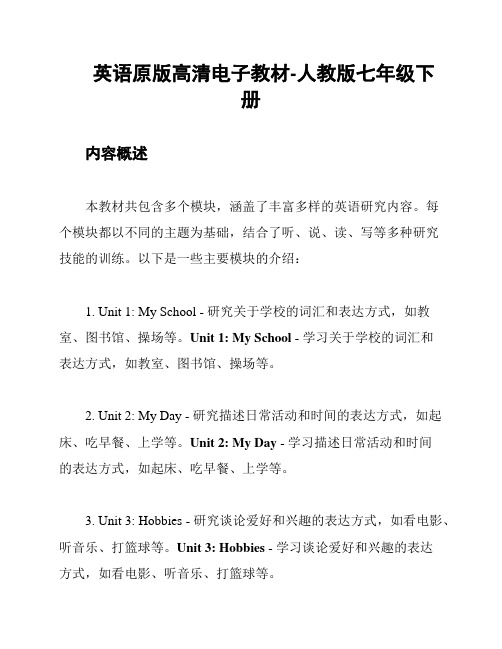
英语原版高清电子教材-人教版七年级下册内容概述本教材共包含多个模块,涵盖了丰富多样的英语研究内容。
每个模块都以不同的主题为基础,结合了听、说、读、写等多种研究技能的训练。
以下是一些主要模块的介绍:1. Unit 1: My School - 研究关于学校的词汇和表达方式,如教室、图书馆、操场等。
Unit 1: My School - 学习关于学校的词汇和表达方式,如教室、图书馆、操场等。
2. Unit 2: My Day - 研究描述日常活动和时间的表达方式,如起床、吃早餐、上学等。
Unit 2: My Day - 学习描述日常活动和时间的表达方式,如起床、吃早餐、上学等。
3. Unit 3: Hobbies - 研究谈论爱好和兴趣的表达方式,如看电影、听音乐、打篮球等。
Unit 3: Hobbies - 学习谈论爱好和兴趣的表达方式,如看电影、听音乐、打篮球等。
4. Unit 4: Our Country - 研究关于国家和国籍的词汇,以及描述地理位置的表达方式。
Unit 4: Our Country - 学习关于国家和国籍的词汇,以及描述地理位置的表达方式。
5. Unit 5: Food and Health - 研究关于食物和健康的词汇,以及描述喜好和建议的表达方式。
Unit 5: Food and Health - 学习关于食物和健康的词汇,以及描述喜好和建议的表达方式。
6. Unit 6: Festivals - 研究关于节日和庆祝活动的词汇,如春节、圣诞节、生日等。
Unit 6: Festivals - 学习关于节日和庆祝活动的词汇,如春节、圣诞节、生日等。
特点和优势1. 高清电子教材 - 本教材提供高清的电子版,便于学生在电脑或平板设备上阅读和研究。
高清电子教材 - 本教材提供高清的电子版,便于学生在电脑或平板设备上阅读和学习。
2. 丰富多样的研究内容 - 每个模块都涵盖了不同主题的研究内容,帮助学生扩展词汇量和语言运用能力。
英语七年级下册全册短语归纳

英语七年级下册全册短语归纳1.下象棋 _______________2.说英语 ________________3.弹吉他、弹钢琴、拉小提琴、打鼓 ______________________________4.游泳俱乐部________________________5.随音乐起舞____________________________6.想要做某事________________________________________7.参加艺术俱乐部_______________________________8.擅长于做某事________________________________________与某人相处得好_______________________________________对某人有好处_______________________________________9.讲故事_______________________10.喜欢干某事_______________________11.与人们玩游戏______________________________________12.唱歌和跳舞______________________________________13.与某人交朋友______________________________________14.需要你帮助有关体育方面的事_______________________需要教音乐的帮助__________________________________15.在周末_____________________________________你能游泳吗?_____________________是的,我能。
_____________________不,我不能。
_________________________________________16 你想参加什么俱乐部?_______________________我想参加象棋俱乐部。
(完整版)仁爱版七年级英语下册单词表

school 在学校;在上课
[mu:vi prep.在…后conj.在…以后
[bed] n.床
[bɑ:sktb:l] n.篮球
[swm] v.& n.游泳
swimming 去游泳
['lsn] v.(注意地)听
['mju:zk] n.音乐;乐曲
['labrr] n.图书馆,图书室
[nju:zpep(r)] n.报纸
and Found 失物招领处
['mn] n.钱
[wɑ:lt] n.钱包
['rand] adv&rep.到处;围绕
[fju:] adj.很少,不多pron.很少人(或事物、
few 一些
[gem] n.比赛;运动;游戏
[st] (过去式sat) v.坐
[ntrst] adj.有趣的
['dfklt] adj.难的
[l:n] v.学习,学会
[wt] det&pron.哪一个;哪一些
['sbdkt] n.学科;主题 best [best] adv.& adj.最好地(的)(good和well的最高级) study [stdi] v.学习;研究n.书房 outdoor [atd:(r)] adj.户外的;室外的 activity [k'tvt] n.活动 attention [tenn] n.注意 between [btwi:n] prep.在(两者)之间;在……中间 stamp [stmp] n.邮票v.跺脚 Saturday [stde] n.星期六 from…to… 从…到… night [nat] n.夜间 sound [sand] n.声音v.听起来好像 February [februri] n.(Feb.)二月 hard [hɑ:d] adj.努力的;困难的adv.艰难地;努力地 late [let] adv.晚,迟adj.迟(的),晚(的) Unit6 Topic 1 beautiful ['bju:tfl] adj.美丽的 garden ['ɡɑ:dn] n. 花园 bedroom [bedru:m] n.卧室 second ['seknd] num.&adv.第二 floor [fl:(r)] n.楼层;地板 and so on 等等 upstairs [pstez] adv.在(或向)楼上 kitchen ['ktn] n.厨房 dining room [dan ru:m] 餐厅 living room [livi ru:m] 客厅;起居室 bathroom [bɑ:θru:m] n.浴室,洗手间 first [f:st num.&adv.第一 lamp [lmp] n.灯 clock [klk] n.钟 near [n(r)] prep.在…附近adv.在附近 aaj.近的 under [nd(r)] prep在…下面;少于 chair [te(r)] n.椅子 behind [bhand] prep.(表示位置)在……后面 front [frnt] n.前面;前部 adj.前面的;前部的 in front of 在……前面 guitar [ɡtɑr] n.吉他 window [windu] n.窗户 table ['tebl] n.桌子;表格 key [ki:] n.钥匙;关键 put [pt] v.放
人教版英语7年级(下册)目录及单元详解经典总结
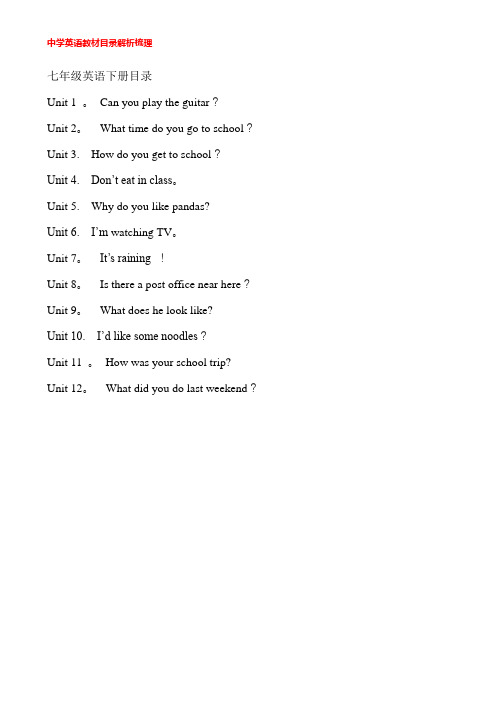
Life n。生活,生命
Rick里克(男名)
Jim吉姆(男名)
Scott斯科特(男名)
Tony托尼(男名)
重点短语
1.what time几点
2.go to school去上学
3.get up起床
4。take a shower洗淋浴
5。brush teeth刷牙
10。do kung fu练(中国)功夫
11。tell stories讲故事
12.play games做游戏
13.on the weekend/on weekends在周末
目标句型
1.Can you draw?Yes, I can. / No,I can't。
2.What club do you want to join?I want to join the chess club。
Unit 12。What did you do last weekend?
七年级下册
单元标题
Unit 1 Can you play the guitar?
单元话题
谈论活动
语法目标
情态动词can
重点
词汇
guitar n.吉他
sing v.唱;唱歌
swim v。游泳
dance v.跳舞;舞蹈
draw v。画
6。get to到达
7.do homework做家庭作业
8.go to work去上班
9。go home回家
10。eat breakfast吃早饭
11。get dressed穿上衣服
12.get home到家
13。either…or…要么…要么…
七年级下册英语生词摘抄

七年级下册英语生词摘抄以下是七年级下册英语课本中的一些生词:1. 科学(名词):science2. 地理(名词):geography3. 历史(名词):history4. 数学(名词):math5. 物理(名词):physics6. 化学(名词):chemistry7. 生物学(名词):biology8. 艺术(名词):art9. 音乐(名词):music10. 体育(名词):sports11. 文学(名词):literature12. 计算机科学(名词):computer science13. 社会研究(名词):social studies14. 电影(名词):movie15. 电视(名词):television16. 新闻(名词):news17. 杂志(名词):magazine18. 报纸(名词):newspaper19. 小说(名词):novel20. 短篇小说(名词):short story21. 剧本(名词):play22. 电台(名词):radio23. 录音机(名词):recorder24. 影碟机(名词):VCR25. CD机(名词):CD player26. 家用电脑(名词):home computer27. 因特网(名词):Internet28. 万维网(名词):World Wide Web (29. 网络浏览器(名词):web browser30. 网络冲浪(动词短语):surf the Internet31. 网络购物(动词短语):shop online32. 网络聊天室(名词):online chat room33. E-mail地址(名词):E-mail address34. 密码(名词):password35. 发电子邮件(动词短语):send an e-mail36. 网络犯罪(名词):cybercrime37. 网络病毒(名词):computer virus38. 网络警察(名词):cybercop39. 网络空间(名词):cyberspace40. 网络朋友(名词):cyberfriend41. 网络学校(名词):cyber school42. 网络游戏(名词):cyber game43. 网络咖啡屋(名词):cybercafe44. 网络广告(名词):cyber ad (注意:在某些地区,"cyber" 可能是一个贬义词,所以使用时请谨慎。
鲁教版英语七年级下册单词表

鲁教版英语七年级下册单词表Unit 1sitcom ['sɪtkɒm] n.(=situation comedy)情景喜剧news n.新闻节目;新闻soap opera[səʊp]肥皂剧educational [edʒu'keɪʃənl] adj.教育的;有教育意义plan [plæn] n.&v.打算;计划hope [həʊp] n.希望find out查明、弄清discussion [dɪ'skʌʃn] n.讨论;商量stand [stænd] v.站立;忍受happen ['hæpən] v.发生;出现may[ meɪ] modalv.可以;可能,也许expect[ɪk'spekt]v.预料;期待joke [dʒəʊk] n.笑话;玩笑v.说笑话;开玩笑comedy ['kɒmədi] n.喜剧;喜剧片meaningless ['mi:nɪŋləs]adj.毫无意义的;意思不明确的action ['ækʃn] n.行动action movie动作影片cartoon kɑ'tu:n] n.卡通片;动画片culture ['kʌltʃə(r)] n.文明;文化famous ['feɪməs]adj.著名的;有名的appear [ə'pɪə(r)] v.出现become [bɪ'kʌm] v.变成;开始变得rich [rɪtʃ] adj.富有的successful [sək'sesfl] adj.获得成功的;有成就的;有成效的might [maɪt] modalv.可能;可以;may的过去式main [meɪn] adj.主要的;最重要的reason ['ri:zn] n.原因;理由film [fɪlm] n.(=movie)电影unlucky [ʌn'lʌki] adj.不幸的;不吉利的lose(lost)[lu:z] v.丢失;失去girlfriend n.女朋友ready ['redi] adj.准备好的;愿意的be ready to愿意迅速做某事character ['kærəktə(r)] n.角色;人物;simple ['sɪmpl]adj.简单的;易做的dress up装扮;乔装打扮take sb.’s place代替;替换army ['ɑ:mi] n.陆军部队;陆军do a good job工作干得好;做得好Unit2grow up长大;成长;成熟computer programmer计算机程序设计员;编程人员cook n.厨师v.烹饪;煮(烧烤、煎、炸等)doctor n.医生engineer [endʒɪ'nɪr] n.工程师violinist [vaɪə'lɪnɪst]n.小提琴手pilot ['paɪlət] n.飞行员pianist ['pɪənɪst] n.钢琴家scientist['saɪəntɪst] n.科学家be sure about确信;对….有把握make sure确保;查明college ['kɑːlɪdʒ] n.学院;大学;高等专科学校education [edju'keɪʃn] n.教育medicine ['medsn] n.药,医学university [juːnɪ'vɜːrsəti]n.(综合性)大学,高等学府London伦敦article ['ɑːrtɪkl]n.文章,论文send [send]v.邮寄,发送resolution [rezə'luːʃn] n.决心,决定team n.队;组foreign ['fɔːrən] adj.外国的able [ebəl]adj.能够be able to能够做某事question v.表示疑问;怀疑;提问;质询meaning n.意义;意思discuss [dɪ'skʌs] v.讨论,商量promise [prɑmɪs]n.承诺,诺言v.许诺;承诺;答应beginning [bɪɡɪnɪŋ]n.开头,开端at the beginning of在….开始improve [ɪmpruv] v.改进,改善write down写下;记录下physical ['fɪzɪkl] adj.身体的;肉体的themselves pron.他(她、它)们自己have to do with关于;与……有关系self-improvement [selfɪmp'ruːvmənt]n.自我改进,自我提高take up(尤指为消遣)学着做;开始做hobby ['hɑːbi] n.业余爱好weekly adj.&adv.每周的(地)Schoolwork n.学校作业;功课own [oʊn] adj.&pron.自己的,本人的personal ['pɜːrsənl] adj.个人的,私人的relationship [rɪ'leɪʃnʃɪp] n.关系;联系agree with同意Unit 3Paper n.纸;纸张pollution [pə'luːʃn] n.污染;污染物prediction[prɪ'dɪkʃn]n.预测;预言future ['fjuːtʃər] n.未来;将来pollute[pə'luːt] v.污染environment [ɪn'vaɪrənmənt] n.环境planet ['plænɪt] n.行星earth[ɜːrθ] n.地球;世界plant [plænt] v.种植n.植物part [pɑːrt] n.参加,参与;部分play a part参与(某事)peace [piːs] n.和平sea n.海;海洋sky[skaɪ] n.天空astronaut['æstrənɔːt] n.宇航员;航天员apartment[ə'pɑːrtmənt] n.公寓套房rocket ['rɑːkɪt]n.火箭;space[speɪs] n.空间;太空space station太空站;宇宙空间站hman adj.人的;人本性的 n.人servant['sɜːrvənt] n.仆人dangerous ['deɪndʒərəs]adj.有危险的;不安全的already[ɔːl'redi] adv.已经;早已factory['fæktri] n.工厂over and over again多次;反复地believe [bɪ'liːv] v.相信;认为有可能disagree [dɪsə'ɡriː] v.不同意;持不同意见;有分岐even['iːvn]adv.甚至;连;愈加hundreds of许多;大量shape [ʃeɪp] n.形状;外形fall [fɔːl] v.倒塌;跌倒;掉落fall down突然倒下;跌倒;倒塌inside adv.&prep.在….里面look for寻找;寻求possible ['pɑːsəbl] adj.可能存在或发生的;可能的impossible ['pɑːsəbl] adj.不可能存在或发生的;有可能的side n.一方(的意见、态度、立场)probably ['prɑːbəbli] adv.大概;很可能during prep.在….期间holiday ['hɑːlədeɪ]n.假期;假日word [wɜːrd]n.单词;词Unit 4shake n.&v.摇动;抖动milk shake奶昔blender['blendər] n.食物搅拌器turn on接通(电流、煤气、水等);打开peel [piːl] v.剥皮;去皮pour [pɔːr] v.倒出;倾倒yogurt['joʊɡərt] n.(=yoghurt)酸奶;honey ['hʌni] n.蜂蜜watermelon ['wɔːtərmelən] n.西瓜spoon [spuːn] n.勺,调羹pot n.锅add[æd]v.增加;添加finally['faɪnəli] adv.最后,最终salt[sɔːlt] n.食盐sugar['ʃʊɡər] n.食糖cheese[tʃiːz] n.干酪,奶酪popcorn ['pɑːpkɔːrn]n.爆米花corn [kɔːrn] n.玉米,谷物machine[mə'ʃiːn] n.机器;机械装置dig v.掘(地);凿(洞);挖(土)hole n.洞;坑;孔sandwich['sænwɪtʃ]n.夹心面包片;三明治butter['bʌtər] n.黄油,奶油turkey ['tɜːrki] n.火鸡lettuce ['letɪs] n.莴苣,生菜piece[piːs]n.段;片;块;Thanksgiving n.感恩节traditional [trə'dɪʃənl] adj.传统的;惯例的autumn n.秋天;秋季traveler n. (=traveller)漂泊者;旅行者;游客England['ɪŋɡlənd]英格兰celebrate['selɪbreɪt]v.庆祝;庆贺mix v.(使)混合;融合pepper ['pepər] n.甜椒;柿子椒fill v.(使)充满;装满oven['ʌvn] n.烤箱;烤炉plate n.盘子;碟子cover['kʌvər] v.遮盖,覆盖n.覆盖物;盖子gravy['ɡreɪvi]n.(调味)肉汁serve[sɜːrv] v.接待,服务;提供temperature ['temprətʃər] n.温度,气温;体温Unit 5prepare [prɪ'per] v.使做好准备;把…准备好prepare for为…做准备exam[ɪɡ'zæm] n. (=examination)考试flu n.流行性感冒;流感available[ə'veɪləbl] adj.可获得的;有空的;another time其他时间;别的时间until[ən'tɪl] conj.&prep.到...时;直到…为止hang[hæŋ]v.悬挂;垂下hang out常去某处;泡在某处catch[kætʃ] v.及时赶上;抓住;接住accept[ək'sept] v.接受;refuse [rɪ'fjuːz] v.拒绝the day before yesterday前天the day after tomorrow后天weekday n.工作日(星期一至星期五的任何一天)look after照料;照顾invite [ɪn'vaɪt] v.邀请invitation [ɪnvɪ'teɪʃn] n.邀请;请柬turn down拒绝reply [rɪ'plaɪ] v.回答,答复forward['fɔːrwərd] v.转寄;发送 adv.向前;前进delete [dɪ'liːt] v.删除print v.打印;印刷sad adj.(令人)悲哀的;(令人)难过的goodbye interj.&n.再见take a trip去旅行glad adj.高兴;愿意preparation [prepə'reɪʃn] n.准备,准备工作glue n.胶水without prep.没有;不(做某事)surprised adj.惊奇的;感觉意外的look forward to盼望;期待hear from接到(某人的)信、电话等housewarming n.乔迁聚会opening['oʊpnɪŋ] n.开幕式,落成典礼concert ['kɑːnsərt] n.音乐会;演奏会headmaster[hed'mæstər] n.(尤指私立学校)校长event[ɪ'vent] n.大事,公开活动;比赛项目guest[ɡest] n.客人;宾客calendar['kælɪndər] n.日历,日程表daytime n.白天;日间Unit 6meeting n.会议;集会;会面video ['vɪdioʊ] n.录像,录像带organize['ɔːrɡənaɪz] v. (=organise)组织,筹备potato chips炸土豆片;炸薯条chocolate ['tʃɑːklət] n.巧克力upset[ʌp'set] adj.难过,失望;沮丧taxi n.出租汽车;的士advice[əd'vaɪsɪ] n.劝告,建议travel['trævl] v.&n.旅行;游历agent['eɪdʒənt] n.代理人,经纪人expert ['ekspɜːrt] n.专家keep..to oneself保守秘密teenager ['tiːneɪdʒə]n.(13-19岁的)青少年normal['nɔːrml] adj.正常的;一般的unless[ən'les] conj.除非,如果不certainly ['sɜːrtnli] adv.当然,肯定;行;无疑wallet['wɑːlɪt] n.钱包mile n.英里angry ['æŋɡri] adj.生气的,发怒的understanding [ʌndər'stændɪŋ]adj.善解人意的;体谅人的careless ['kerləs] adj.粗心的,不小心的mistake[mɪ'steɪk] n.错误,失误himself pron.他自己careful['kerfl] adj.小心的;细致的;精心的;慎重的advise [əd'vaɪz] v.劝告,建议solve [sɑːlv] v.解决;解答step n.步;步骤trust[trʌst] v.相信,信任experience [ɪk'spɪriəns] n.经验,经历in half分成两半halfway [hæf'weɪ] adv.在中途的;到一半;部分地做到或达到Unit 7matter[ˈmætə] v.重要,要紧,有关系What’s the matter?怎么了?出什么事了?sore[sɔ:(r)] adj.疼痛的,酸痛的have a cold感冒stomach['stʌmək] n.胃,腹部stomachache['stʌməkeɪk] n.胃痛,腹痛have a stomachache胃痛foot(复数feet) [fu:t] n.脚neck[nek] n.颈,脖子throat[θrəʊt] n.喉咙fever['fi:və] n.发烧,发热lie[laɪ] v.躺,平躺lie down躺下rest[rest] n.剩余部分,其余;放松,休息cough[kɒf] n. & v.咳嗽X-ray['eksreɪ] n. X光,X射线toothache[ˈtu:θeɪk] n.牙痛take one's temperature量体温headache[ˈhedeɪk] n.头痛have a fever发烧break[breɪk] n. & v.休息,暂停;打破take breaks (take a break)休息hurt[hə:t] v.伤害,损害,使受伤passenger['pæsɪndʒə] n.乘客,旅客off[ɒf] adv. prep.离开(某处);从…去掉get off下车to one's surprise使…惊讶,出乎…意料onto[ˈɒntə] prep.向,朝trouble[ˈtrʌbl] n.麻烦,烦扰,问题hit[hit] n. & v.碰撞,打,打击right away立即,马上get into陷入,参与herself[hə:ˈself] pron.她自己,她本身(she的反身代词)bandage['bændɪdʒ] n. & v.绷带;用绷带包扎sick[sɪk] adj.患病的,不适的knee[ni:] n.膝盖nosebleed[ˈnəʊzbli:d] n.鼻出血breathe[bri:ð] v.呼吸sunburned[ˈsʌnbɜ:nd] adj.晒伤的ourselves[ɑ:ˈselvz] pron.我们自己(we的反身代词)climber[ˈklaɪmə(r)] n.登山者be used to习惯于…适应于…risk[rɪsk] n. & v.风险,危险;冒险take risks (take a risk)冒险accident[ˈæksidənt] n.意外事件;事故situation[ˌsitjuˈeiʃən] n.状况,形式,情况kg=kilogram[ˈkɪləgræm] n.公斤,千克rock[rɔk] n.岩石run out (of)用尽,耗尽knife[naif] n.刀,餐刀cut off切除blood[blʌd] n.血mean[mi:n] v.意味着,意思是,意欲get out of离开,从…出来importance[ɪmˈpɔ:tns] n.重要性decision[dɪ'sɪʒn] n.决心,决定,抉择control[kən'trəʊl] v.控制,支配,操纵be in control of掌管,管理spirit['spɪrɪt] n.勇气,意志death[deθ] n.死亡give up放弃nurse [nə:s] n.护士Judy/'dʒu:dɪ/朱迪(女名)Nancy/'nænsɪ/南希(女名)Mandy/'mænde/曼迪(女名)Aron /'eərən/阿伦·罗尔斯顿Utah/'ju:tɑ:/犹他州(美国)Unit 8clean up打扫(清除)干净cheer[tʃiə] v.欢呼cheer up变得更高兴,振奋起来give out分发,散发volunteer[ˌvɔlənˈtiə] n. & v.志愿者;义务做come up with想出,提出put off推迟sign[saɪn] n.标记,符号,标牌notice[ˈnəʊtɪs] n. & v.通知,公告;注意到hand out分发call up打电话给…某人,征召used to曾经…,过去…lonely['ləʊnlɪ] adj.孤独的,寂寞的care for照顾,非常喜欢several[ˈsevrəl] prep.几个,数个,一些strong[strɒŋ] adj.强壮的,强烈的feeling[ˈfi:lɪŋ] n.感觉,感触satisfaction [ˌsætɪs'fækʃn] n.满足,满意joy[dʒɔɪ] n.高兴,愉快owner[ˈəʊnə(r)] n.所有者,物主try out参加…选拔,试用journey['dʒɜ:nɪ] n.(尤指长途)旅行,行程raise[reɪz] v.抬起,举起,筹集,征集alone[əˈləun] adv.独自地,孤独地repair[riˈpɛə] v.修理,修补fix[fiks] v.修理,安装fix up修理,修补give away赠送,捐赠take after(外貌或行为)像broken['brəʊkən] adj.破损的,残缺的wheel[wi:l] n. & v.轮子,车轮;旋转letter[ˈletə] n.信件,字母Miss[mɪs] n.小姐set up建立,设立disabled[disˈeibəld] adj.有残疾的,丧失能力的make a difference影响,有作用blind[blaɪnd] adj.盲的,盲目的,失明的deaf[def] adj.聋的imagine[ɪˈmædʒɪn] v.想象,设想difficulty['dɪfɪkəltɪ] n.困难open[ˈəʊpən] v.打开door[dɔ:] n.门carry['kærɪ] v.携带,搬运train[treɪn] v.训练,培养excited[ɪkˈsaɪtɪd] adj.激动的,兴奋的training[ˈtreɪnɪŋ] n.训练,培训kindness[ˈkaɪndnəs] n.仁慈,善良,亲切,善意clever[ˈklevə] adj.聪明的,机灵的understand[ˌʌndəˈstænd] v.懂,理解change[tʃeɪndʒ] n. & v.改变interest['ɪntrəst] n. & v.感兴趣;兴趣sir[sɜ:(r)] n.先生madam ['mædəm] n.夫人,女士Mario /'mereo/马里奥(男名)Jimmy /'dʒɪmɪ/吉米(男名)。
七年级英语下册动词短语归纳

七年级英语下册动词短语归纳play the guitar 弹吉他play chess with sb 下棋play the drums 敲鼓play the violin 拉小提琴play computer games 玩电脑游戏play badminton 打羽毛球get up 起床get dressed 穿上衣服take a shower 洗淋浴brush teeth 刷牙eat breakfast 吃早饭take a walk 散步go to bed 上床睡觉get home 到达家have a healthy life 有一个健康的生活方式have dinner 吃晚饭want to do sth 想做某事want sb to do sth 想让某人做某事like to do/doing sth 喜欢做某事need to do sth需要做某事need sb. to do sth 需要某人做某事teach sb to do sth 教某人做某事forget to do 忘记去做某事remember to do sth. 记住去做某事tell sb. to do sth. 告诉某人做某事wish to do sth希望做某事wish sb to do sth希望某人做某事hope to do sth希望做某事would like to do sth. 想要做某事would like sth 想要某物see sb doing sth. 看见某人正在做某事watch sb doing sth. 看见某人正在做某事spend time (in) doing 花费时间做某事have a great time(in)doing 开心做某事have fun(in)doing 做某事有趣enjoy doing sth. 喜欢做某事practice sth / doing sth 练习做某事go fishing 去钓鱼go boating 去划船go shopping 去购物go swimming 去游泳go camping 去露营go skating 去滑冰go to the cinema 看电影go to the beach 去海滩go to the movies 去看电影go to sleep 去睡觉go to school 去上学go along the road 沿着路go across the street 过马路go home 回家go there 去那里go for a walk 去散步miss sb. 思念某人help sb with sth 在某方面帮助某人talk to/with sb 跟某人谈话talk about sth/sb 谈论某事/某人speak to sb. 给某人通话call sb. back (给某人)回电话call sb. at …… 给某人打电话…write to sb. 给某人写信tell sb about sth… 告诉某人关于某事show sb around +地点. 带某人逛某地show sb. sth.=show sth. to sb. 把某物展示给某人wake sb up 把某人弄醒shout at sb/shout tosb 大声喊叫某人fight with sb 与某人打架make friends with sb 结交朋友buy sth for sb. 为某人买某物take a message for sb. 为某人捎信pay 金钱for sth 为某物花钱spend time/money on sth 在某物上花时间或金钱take the train 乘火车ride a bike 骑自行车take the subway 乘地铁walk to.... 步行去…drive to.... 开车去…fly to…. 坐飞机去drive his car to work 开车去上班go on a ropeway 乘索道bring sth/sb to … 把某人/物带来某处take sth/sb to.... 把带某人/物到某地watch TV看电视talk on the phone 通过电话交谈watch the boat races 看龙舟比赛read a newspaper 看报纸read a story to sb 给某人读故事feed chickens 喂鸡grow apples 种苹果pick some strawberries 摘草莓climb the mountains 爬山visit my grandparents 拜访我的祖父母visit a museum 参观博物馆make a fire 生火make zongzi 包粽子make a wish 许愿make soup 做汤make breakfast做早饭make your bed 整理床铺make rules 制定规则wear a hat 戴帽子wear school uniforms 穿校服wear glasses 戴眼镜wear jeans 穿牛仔裤wear sports shoes 穿运动鞋think of 认为想起think about 考虑study English 学习英语study hard 努力学习study for a test 为考试而学习clean his room 打扫他的房间wash the dishes 洗碟子do kung fu 表演功夫;练功夫do(one’s)homework做(某人的)家庭作业do the dishes 洗盘子do some washing 洗衣服do some reading 读书do some shopping 购物get to school 到达学校get home 到家arrive in China 到达中国arrive at school 到达学校arrive home 到家stay up 熬夜wake up 醒来run away 跑开fly a kite 放风筝milk a cow 挤牛奶ride a horse 骑马go on a trip 去旅行cut down 砍倒cut up 切碎cut off 切断follow the rules 遵守规则turn right/ left 向右/左转look like sb/sth 看起来像put on 穿上,戴上put up the tents 搭建帐篷blow out 吹灭listen to music 听音乐leave for … 出发前往某地thanks for +n /doing sth.为…而感谢arrive late for class 上课迟到leave sth +地点把某物留….在某处be made of... 由…制成feel well 感觉好taste good 尝起来好get popular 变得流行keep warm 保持温暖keep my hair short 保持头发短come true 实现;成为现实come from 来自cross the river 过河speak English 说英语tell stories 讲故事take / do exercise 锻炼take one’s order 点菜get a surprise 吃惊注: 1.一般现在时有一个特殊人称(第三人称单数)如果主语是第三人称单数,动词要变成三单形式。
鲁教版五四学制初中英语七年级下册(英语单词表)

鲁教版五四学制初中英语七年级下册(英语单词表,带发音)Unit 1sitcom英音 [ˈsɪtkɒm]美音 [ˈsɪtkɑ:m]abbr. 情景喜剧(situation comedy)situationcomedyn. 【影视】情景喜剧news 英音 [nju:z]美音 [nu:z]n. 新闻,消息;新闻报导soap英音 [səʊp]美音 [soʊp]n. 肥皂 vt. 将肥皂涂在……上;对……拍马屁(俚语) vi. 用肥皂擦洗educational英音 [ˌedʒuˈkeɪʃənl]美音 [ˌɛdʒəˈkeʃənəl]adj. 教育的;有教育意义的plan 英音 [plæn]美音 [plæn]n. 计划;平面图 vt. 计划;设计;打算 vi. 计划;打算hope n. 希望;期望;信心 vi. 希望;期待;信赖 vt.希望;期望find out na. 查出;发现;看清…的面目;识破discussion英音 [dɪˈskʌʃn]美音 [dɪˈskʌʃən]n. 讨论,议论stand 英音 [stænd]美音 [stænd]n. 站立;立场;看台;停止 vi. 站立;位于;停滞 vt. 使站立;忍受;抵抗happen英音 ['hæpən]美音 [ˈhæpən]vi. 发生;碰巧;偶然遇到may英音 [meɪ]美音 [me ɪ]aux. 可以,能够;可能,也许;祝,愿;会,能expect英音 [ɪk'spekt]美音 [ɪkˈsp ɛkt]vi. 期待;预期 vt. 期望;指望;认为;预料joke英音 [dʒəʊk]美音 [dʒok]n. 玩笑,笑话;笑柄 vt. 开…的玩笑 vi. 开玩笑comedy英音 ['kɒmədɪ]美音 [ˈkɑmɪdɪ]n. 喜剧;喜剧性;有趣的事情meaningless英音 [ˈmi:nɪŋləs]美音 [ˈminɪŋlɪs]adj. 无意义的;无目的的action英音 ['ækʃn]美音 [ˈækʃən]n. 行动;活动;功能;战斗;情节action movie n. 动作影片cartoon 英音 [kɑ:'tu:n]美音 [kɑrˈtun]n. 卡通片,[电影] 动画片;连环漫画 vt. 为…画漫画 vi. 画漫画culture英音 ['kʌltʃə(r)]美音 [ˈkʌltʃɚ]n. 文化,文明;修养;栽培 vt. [细胞][微] 培养(等于cultivate)famous英音 ['feɪməs]美音 [ˈfeməs]adj. 著名的;极好的,非常令人满意的appear英音 [ə'pɪə(r)]美音 [əˈpɪr]vi. 出现;显得;似乎;出庭;登场become英音 [bɪ'kʌm]美音 [bɪˈkʌm]vt. 适合;相称 vi. 成为;变得;变成became英音 [bɪ'keɪm]美音 [bɪˈkem]v. 变得(become的过去式)rich英音 [rɪtʃ]美音 [rɪtʃ]adj. 富有的;肥沃的;昂贵的 adj. 油腻的,含有很多脂肪successful英音 [səkˈsesfl]美音 [səkˈsɛsfəl]adj. 成功的;一帆风顺的might英音 [maɪt]美音 [maɪt]n. 力量;威力;势力 v. 可以;或许(may的过去式);应该 aux. 可能;也许main英音 [meɪn]美音 [men]n. 主要部分,要点;体力;总管道 adj. 主要的,最重要的;全力的reason 英音 ['ri:zn]美音 [ˈrizən]n. 理由;理性;动机 vt. 说服;推论;辩论 vi.推论;劝说common英音 ['kɒmən]美音 [ˈkɑmən]n. 普通;平民;公有地 adj. 共同的;普通的;一般的;通常的film英音 [fɪlm]美音 [fɪlm]n. 电影;薄膜;胶卷;轻烟 vt. 在…上覆以薄膜;把…拍成电影 vi. 摄制电影;生薄膜;变…movie英音 [ˈmu:vɪ]美音 [ˈmuvɪ]n. 电影;电影院;电影业 adj. 电影的unlucky英音 [ʌn'lʌkɪ]美音 [ʌnˈlʌkɪ]adj. 不幸的;倒霉的;不吉利的lose 英音 [lu:z]美音 [luz]vt. 浪费;使沉溺于;使迷路;遗失;错过 vi.失败;受损失lost英音 [lɒst]美音 [lɒst, lɑst]adj. 失去的;丧失的;迷惑的 v. 遗失(lose的过去分词);失败girlfriend英音 ['ɡɜ:lfrend]美音 [ˈɡɜ:lˌfrɛnd]n. 女朋友 女伴ready英音 ['redɪ]美音 [ˈrɛdɪ]n. 现款;预备好的状态 adj. 准备好;现成的;迅速的;情愿的;快要…的 vt. 使准备好…be ready to准备好;准备做某事;预备character英音 ['kærəktə(r)]美音 [ˈkærəktɚ]n. 性格,品质;特性;角色;[计] 字符 vt.印,刻;使具有特征simple英音 ['sɪmpl]美音 [ˈsɪmpəl]n. 笨蛋;愚蠢的行为;出身低微者 adj. 简单的;单纯的;天真的dress up na. 乔装;装扮;为…打扮;盛装打扮take sb.'s place解构发生;就位army英音 ['ɑ:mɪ]美音 [ˈɑrmɪ]n. 陆军,军队do a good job好好干;干得好;干得很好Unit 2Sarahn. 莎拉(女子名);萨拉(《圣经》中的人物)Walt Disney 迪士尼;华特迪士尼;迪斯尼Minnie n. 迫击炮 vt. 用迫击炮轰击Mickey Mousen. 米老鼠;分掷炸弹的装置;〈美俚〉【军】多余或无关重要的东西 adj. 质量不高的;太…Steamboat Willie 无Hollywood英音 [ˈh ɒli:ˌw ʊd]美音 [ˈhɑli ˌw ʊd]n. 好莱坞the Hollywood Walk of Fame无grow up na. 长大computer programmer un. 计算机程序员;计算机程序设计员;计算机程设计员cook 英音 [k ʊk]美音 [k ʊk]n. 厨师,厨子 vt. 烹调,煮 vi. 烹调,做菜doctor英音 ['d ɒkt ə(r)]美音 [ˈdɑkt ɚ]vt. 修理;篡改,伪造;为…治病;授以博士学位 n. 医生;博士 vi. 就医;行医engineer 英音 [ˌend ʒɪ'n ɪə(r)]美音 [ˌɛnd ʒəˈn ɪr]n. 工程师;工兵;火车司机 vt. 设计;策划;精明地处理 vi. 设计;建造violinist 英音 [ˌva ɪəˈl ɪn ɪst]美音 [ˌva ɪəˈl ɪn ɪst]n. 小提琴演奏者,小提琴家driver 英音 ['dra ɪv ə(r)]美音 [ˈdra ɪv ɚ]n. 驾驶员;驱动程序;起子;传动器pilot 英音 [ˈpa ɪl ət]美音 [ˈpa ɪl ət]n. 飞行员;领航员 adj. 试点的 v. 驾驶;领航;试用pianist 英音 [ˈp ɪən ɪst]n. 钢琴家;钢琴演奏者美音 [pɪˈænɪst, ˈpɪənɪst]scientist英音 [ˈsaɪəntɪst]美音 [ˈsaɪəntɪst]n. 科学家be sure about un. 就象…一样地不容怀疑。
七年级英语下册【Unit1】常考词形变化整理七年级英语下册【Unit1】常考词形变化整理
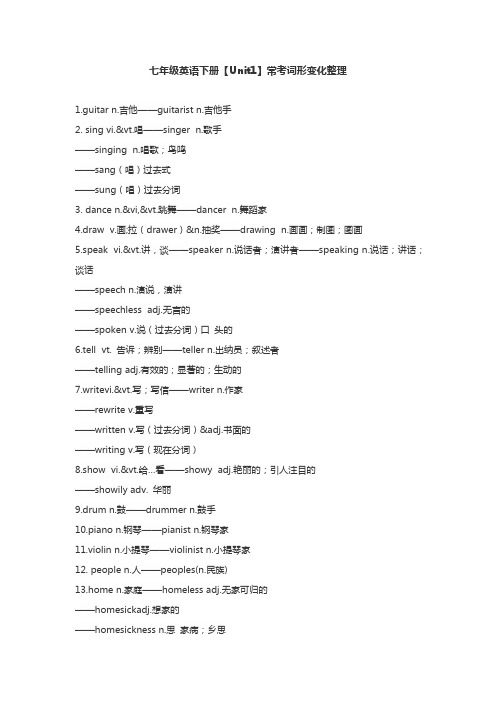
七年级英语下册【Unit1】常考词形变化整理1.guitar n.吉他——guitarist n.吉他手2. sing vi.&vt.唱——singer n.歌手——singing n.唱歌;鸟鸣——sang(唱)过去式——sung(唱)过去分词3. dance n.&vi,&vt.跳舞——dancer n.舞蹈家4.draw v.画;拉(drawer)&n.抽奖——drawing n.画画;制图;图画5.speak vi.&vt.讲,谈——speaker n.说话者;演讲者——speaking n.说话;讲话;谈话——speech n.演说,演讲——speechless adj.无言的——spoken v.说(过去分词)口头的6.tell vt. 告诉;辨别——teller n.出纳员;叙述者——telling adj.有效的;显著的;生动的7.writevi.&vt.写;写信——writer n.作家——rewrite v.重写——written v.写(过去分词)&adj.书面的——writing v.写(现在分词)8.show vi.&vt.给…看——showy adj.艳丽的;引人注目的——showily adv. 华丽9.drum n.鼓——drummer n.鼓手10.piano n.钢琴——pianist n.钢琴家11.violin n.小提琴——violinist n.小提琴家12. people n.人——peoples(n.民族)13.home n.家庭——homeless adj.无家可归的——homesickadj.想家的——homesickness n.思家病;乡思——homely adj.家常的;平凡的14. make v.制作——maker n.制作者15.center (=centre )n.中心——central adj.中心的16.weekend n.周末——weekends(复数)17. teachvt.教——teacher n.老师——teachingn.教学;教义——teachable adj.可教的18.musician n.音乐家——music n.音乐——musical n.音乐的。
人教版七年级英语下册各单元考点总结

They are kind of/very shy.他们有点儿害羞/非常害羞。
二、考点解析
1.Let’s do sth, let’s=let us 让我们做…… 人称代词用宾格 Let’s 之后跟动词原形。
What are you doing? 你在干什么 I am doing my homework. 我正在做我的家庭作业。
Where are you swimming? 你在哪里游泳 I am swimming at the pool. 我在水池里游泳。
Who is the boy talking to? 这个男孩在对谁说话 He is talking to his teacher.他在对他的老师谈话。
暖的/冷的/凉爽的。 2. How’s
it going? 近况如何 –Great./Not bad/pretty good/ Just so so/ terrible/Boring.很棒/不错/相当好/一般般
/糟糕/无聊的 3. Is Aunt Wang there? 王阿姨在那儿吗 –Yes,she is 是的她在。 /No,she isn’t.不,她不再。
What are you doing?你在干什么 I’m watching TV.我在看电视。
Do you want to go swimming?你想去钓鱼吗 Yes, I do. No, I don’t.
When do you want to go? 你什么时候想去 At three o’ clock.在三点钟。
3.give sb sth=give sth to sb 给某物给某人 4. get sth from sb 从某人出得到某物
七年级英语下册语法重点知识点总结

七年级英语下册语法重点知识点总结英语作为我们学习的第一门外语,同时也是三大科之一,学习并掌握这门课程是我们必须做到的,下面是小编给大家带来的七年级英语下册语法重点知识点总结,希望能够帮助到大家!人教版七年级下册unit 2重点内容归纳【知识归纳】1、Either...or...either…or…主要用于表示选择,其意为“要么…要么…”“或者…或者…”,用于连接两个性质相同的词或短语.如:Youcan have either this one or that one.你拿这个或那个都可以.Youmust either go at once or wait till tomorrow.你要么马上走,要么等到明天.Wecan finish the work either this week or next week.不是这星期就是下星期我们就可完成这项工作.特别注意:either…or…连接两个成分作主语时,谓语动词的形式遵循“就近原则”.如:Eitheryou or I am to go.你或我必须有人去.Eitherhe or you are right.要么他对,要么你对.3、Exerciseexercise做锻炼时为不可数名词,如 do exerciseexercise做练习或操讲为可数名词,如do math exercises,do morning/eye exercises2、job/workjob就是指具体的一份工作,为是可数名词;work做动词时,常指工作状态如:What’syour job?Ihave a wonderful job,it’s so exciting.A:Whatare you doing right at this moment? B:I'm working!work作名词有两种意思:指“工作”时为不可数名词 out of work表示失业;做可数名词时表示“著作”,如Lun Xun’s works4、Lots ofLotsof = a lot of 既可以修饰可数名词又可以修饰不可数名词注意:a lot 不能修饰名词,常用来修饰形容词或动词,为副词词性5、频度副词频度副词按频度从高到底为Always–usually(generally)-often- sometimes-seldom- hardly- never对频度副词提问常用howoften6、Taste··taste作动词时,有两种情况:·taste后可跟名词或代词,意为“尝、品尝某物”。
7年级下英语单词

7年级下英语单词七年级下册的英语单词涵盖多个主题,以下是根据不同单元整理的单词表:Unit 1 Can you play the guitar?•guitar [ɡɪ'tɑː(r)] n. 吉他•sing [sɪŋ] v. 唱;唱歌•swim [swɪm] v. & n. 游泳•dance [dɑːns], [dæns] v. 跳舞;n. 舞蹈•draw [drɔː] v. 画•chess [tʃes] n. 国际象棋•play chess 下国际象棋•speak [spiːk] v. 说(某种语言);说话•speak English 说英语•join [dʒɔɪn] v. 参加;加入•club [klʌb] n. 俱乐部;社团•be good at… 擅长于……•tell [tel] v. 讲述;告诉•story ['stɔːrɪ] n. 故事;小说•write [raɪtʊ] v. 写作;写字•show [ʃə] n. 演出;节目;v. 给……看;展示•or [ɔː(r)] conj. 或者;也不(用于否定句)•talk [tɔːk] v. & n. 说话;交谈•talk to… 跟……说•kungfu [,kʌŋ'fuː] n. (中国)功夫•drum [drʌm] n. 鼓•play the drums 敲鼓•piano [pɪ'ænəʊ] n. 钢琴•play the piano 弹钢琴•violin [,vaɪə'lɪn] n. 小提琴•play the violin 拉小提琴•also ['ɔːlsəʊ] adv. 也;而且•people ['piːpl] n. 人;人们•home [həʊm] n. 家;活动本部;adv. 到家;在家•be good with… 善于应付……的;对……有办法•make [meɪk] v. 使成为;制造•make friends 结交朋友•today [tə'deɪ] adv. 在今天•help (sb) with sth 在某方面帮助(某人)•center ['sentə(r)] n. (=centre)中心;中央•weekend [,wiːk'end], [ 'wiː kend] n. 周末•on the weekend (在)周末•teach [tiːtʃ] v. 教;讲授•musician [mjuː'zɪʃn] n. 音乐家Unit 2 What time do you go to school?•up [ʌp] adv. 向上•get up 起床;站起•dress [dres] v. & n. 穿衣服;连衣裙•get dressed 穿上衣服•brush [brʌʃ] v. & n. 刷;刷净;刷子•tooth [tuːθ] n. (pl. teeth [tiːθ])牙齿•shower ['ʃaʊə] n. & v. 淋浴;淋浴器(间)•take a shower 洗淋浴•usually ['juːʒuəli] adv. 通常地;一般地•forty ['fɔː(r)ti] num. 四十•wow [waʊ] int.(表示惊奇或敬佩)哇;呀•never ['nevə(r)] adv. 从不;绝不•early ['ɜːlɪ] adv. & adj. 早(的)•fifty ['fɪftɪ] num. 五十•job [dʒɒb], [dʒɑːb] n. 工作;职业•work [wɜːk] v. & n. 工作•station ['steɪʃn] n. 电(视)台;车站•radio station 广播电台•o'clock [ə'klɒk], [ə'klɑːk] adv.(表示整点)……点钟•night [naɪt] n. 晚上;夜晚•funny ['fʌnɪ] adj. 奇怪的;滑稽好笑的•exercise ['eksəsaɪz] v. & n. 锻炼;练习•on weekends (在)周末•best [best] adj. & adv. 最好的;最好地;最•group [gruːp] n. 组;群•half [hɑːf], [hæf] n. & pron. 一半;半数•past [pɑːst], [pæst] prep. 晚于;过(时间);adj. 过去的•quarter ['kwɔː(r)tə(r)] n. 一刻钟;四分之一•homework ['həʊmwɜː(r)k] n. 家庭作业•do (one's) homework 做作业•run [rʌn] v. 跑;奔•clean [kliːn] v. 打扫;弄干净;adj. 干净的•walk [wɔːk] n. & v. 行走;步行•take a walk 散步;走一走•quickly ['kwɪkli] adv. 很快地•either ['aɪðə(r)], [ 'iː ðə(r) ] adv. 或者;也(用在否定词组后)•either…or… 要么……要么……;或者……或者……•lot [lɒt], [lɑːt] pron. 大量;许多•lots of 大量;许多•sometimes ['sʌmtaɪmz] adv. 有时•taste [teɪst] v. 有……的味道;品尝;n. 味道;滋味•life [laɪf] n. 生活;生命Unit 3 How do you get to school?•train [treɪn] n. 火车•bus [bʌs] n. 公共汽车;公交车•subway ['sʌbweɪ] n. 地铁•take the subway 乘地铁•ride [raɪd] v. & n. 骑;旅程•bike [baɪk] n. 自行车•ride a bike 骑自行车•sixty ['sɪkstɪ] num. 六十•seventy ['sevntɪ] num. 七十•eighty ['eɪtɪ] num. 八十•ninety ['naɪntɪ] num. 九十•hundred ['hʌndrəd] num. 一百•minute ['mɪnɪt] n. 分钟•far [fɑː] adv. & adj. 远;远的•kilometer ['kɪlə,mitə(r)] n. 公里•new [njuː] adj. 新的;刚出现的•every ['evrɪ] adj. 每一;每个•every day 每天•by [baɪ] prep.(表示方式)乘(交通工具)•by bike 骑自行车•drive [draɪv] v. 开车•car [kɑː] n. 小汽车;轿车•live [lɪv] v. 居住;生活•stop [stɒp] [stɑːp] n. 车站;v. 停止•think of 认为•cross [krɒs] v. 横过;越过•river ['rɪvə] n. 河;江•many ['meni] adj. & pron. 许多•village ['vɪlɪdʒ] n. 村庄;村镇•between [bɪ'twiːn] prep. 介于……之间•between…and… 在……和……之间请注意,以上单词表可能并不完整,且单词的释义和用法可能因上下文和语境的不同而有所变化。
- 1、下载文档前请自行甄别文档内容的完整性,平台不提供额外的编辑、内容补充、找答案等附加服务。
- 2、"仅部分预览"的文档,不可在线预览部分如存在完整性等问题,可反馈申请退款(可完整预览的文档不适用该条件!)。
- 3、如文档侵犯您的权益,请联系客服反馈,我们会尽快为您处理(人工客服工作时间:9:00-18:30)。
21. in his father’s car 坐父亲的车 25. crossing the river is 穿过河是
22. need about 10 minutes to get to school 需要十分钟的时间到达学校
5. match----with 与------匹配 6. play chess 下棋
7. the swimming club 游泳俱乐部 8. what club 什么俱乐部
9. a sports club 一个体育ries 擅长讲故事
37. the Students’ Sports center 学生的运动中38. teach sb to do sth 教某人做某事
39. need help to teach music 需要帮助来做某事
40. the teacher do what he can to help students 老师做他能做的事来帮助学生
33. taste good 尝起来好 34. do her homework 做她的家庭作业 35. have a healthy life 有一个健康的生活方 式
用法集萃
at + 具体时间点 在几点(几分) eat breakfast/ lunch/dinner吃早饭/午饭/晚饭
What club do you want to join? I want to join the chess club.
You can join the English club. Sounds good.
I can speak English and I can also play soccer. Please call Mrs. Miller at 555-3721.
第二单元词组
1. go to school 去上学 2. get up 起床
3. get dressed 穿衣服 4. brush teeth 刷牙
5. eat breakfast 吃早饭 6. take a shower 洗澡
13. walk to , drive to ,fly to 14. I’m not sure 我不敢确信
15. about= around 大约 16. 10 kilometers away from 十公里远
17. good exercise 好的锻炼 18. walk to school 步行去学
27. half an hour 半个小时 28. get home 到达家
29. either-----or 或者----或者 30. eat a good breakfast 吃一顿快餐
31. lots of /a lot of 许多 32. be good for 对------有益
thirty\half past +基数词 ……点半 fifteen\a quarter to +基数词 差一刻到……点
from …to … 从……到…… need to do sth 需要做某事
典句必背
1. What time do you usually get up? I usually get up at six thirty.
七年级英语下册词组
第一单元词组
1. Play the guitar 弹吉他 2. what to do sth 想做 某事
3. join the music club 加入俱乐部 4. speak English 说英语
23. I want to know where Bob lives我想知道鲍勃住到哪
7. how far is it 多远 8. how long does it take sb to do sth花费某人多长时间做某事 9. ten minutes-----how long 10. ten minutes’ walk -------how far
11. ride the bike to school 骑自行车到学校 12. every day 每天
主题:谈论日常作息习惯
My School Day
I am a student. I usually get up at seven, and I eat breakfast at seven thirty. Then I go to school at eight. School starts at eight thirty. I eat lunch at taelve. I go home at 17:00. I often eat dinner at 19:00 and then play the piano. I do my homework at 20:00. At 22:00, I go to bed.
13. from ----to 从哪里到哪里 14. at night 在夜晚
15. a funny time 一个有趣的时间 16. take exercise 锻炼
17. be late for 迟到 18. at about ten twenty 在大约十点二十 19. on weekends 在周末 20. on school days 在上学日
用法集萃
play +棋类/球类 下……棋,打……球 play the +西洋乐器 弹/拉……乐器
be good at doing sth.= do well in doing sth. 擅长做某事
be good with sb. 善于与某人相处 need sb. To do sth. 需要某人做某事
19. show sb sth=show sth to sb把某物展示某人 23. have fun doing 做事情很有趣
20. play games with people 和人们做游戏 24. on the weekend 在周末
21.be in the school music club 学校音乐俱乐部 25. call sb at 给某人打电话
11. the story telling club 讲故事俱乐部 12. like to do/doing 喜欢做某事
13. let’s join 让我们加入 14. sounds good 听起来好
15. students wanted for School Show学校表演招聘学生16. talk to /with跟某人谈话 17. after school 放学后 18. do kung fu 表演功夫
第三单元词组
1. get to school 到达学校 2. take the train 乘火车
3. take the subway 乘地铁 4. ride a bike 骑自行车
5. how do you get to school 怎么到达学校 6. one hundred and five 105
2. That’s a funny time for breakfast. 3. When do students uasually eat dinner?
They usually eat dinner at a quarter to seven in the evening.
4. In the evening, I either watch TV or play computer games.
7. what time 什么时间 8. at six thirty 在六点半
9. an interesting job 一个有趣的工作 10. at the radio station 在广播电视台
11. always /usually/ often/ sometimes/ never 12. your radio show 你的广播节目
can + 动词原形 能/会做某事 a little + 不可数名词 一点儿……
join the …club 加入…俱乐部 like to do sth. =love to do sth. 喜欢/喜爱做某事
典句必背
Can you draw? Yes, I can. / No, I can’t.
31. it +adj +for sb to sth 32. be good with 和某人相处好
33. help for old people 对老人的帮助 34. make friends with 和某人交朋友
35. in July / on the morning of 36. be free / be busy
22. need sb to do sth 需要某人做某事 26. help+sb +v 帮助某人
27. help sb with sth 帮助某人做某事 28. English-speaking students 说英语的学生 29. play the piano 弹钢琴 30. tell sth stories 给某人讲故事
5. At twelve,she eats lots of fruit and vegetables for lunch..
6. She knows it’s not good for her, but it tastes good.
7. Here are your clothes. 佳作赏析
21. half past six 六点半 22. a quarter past three 三点过一刻
23. a quarter to seven 七点差一刻 24. do homework 做家庭作业
